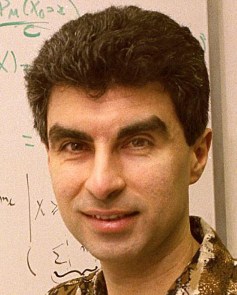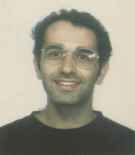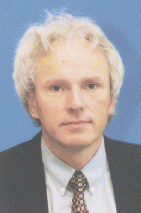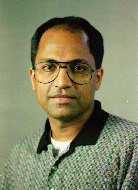Plenary SPEAKERS



Yoshua Bengio is full professor at Universite de Montreal's department of computer science and operations research, deputy director of the Centre de Recherches Mathematiques, and holds the Canada Research Chair in Statistical Learning Algorithms. He is well known and cited for his work on recurrent neural networks, on hybrids of large neural networks with graphical models, and has been successful in applying statistical machine learning in data-mining, financial time-series, and statistical language modeling.
- M.Sc. Computer Science, @ McGill University, 1988
- Ph.D. Computer Science, @ McGill University, 1991
- Postdoc @ MIT (with Mike Jordan), 1991-92
- Researcher @ AT&T Bell Labs, 1992-93 (et collaboration depuis / and continued collaboration)
- Prof. Adjoint / Assistant professor 1993-97 (DIRO, UdeM)
- Prof. Aggrégé / Associate professor 1997- (DIRO, UdeM)
- Titulaire de la Chaire de Recherche du Canada sur les Algorithmes d'Apprentissage Statistique / Canada Research Chair in Statistical Learning Algorithms, 2001-2005
- Directeur Adjoint / Deputy Director, (responsible for MITACS / Responsable pour MITACS), Centre de Recherches Mathématiques /Mathematics Research Center, Université de Montréal.
- Directeur de recherche au CIRANO dans le domaine de la finance quantitative; fellow at the CIRANO research center, in the area of quantitative finance.
- Associate editor of the IEEE Transactions on Neural Networks, associate editor of the Journal of Machine Learning Research, associate editor of Neural Computing Surveys, former associate editor of the Machine Learning Journal, associate editor of the special issue on Data Mining and Knowledge Discovery of the IEEE Transactions on Neural Networks; associate editor of the special issue of the Machine Learning Journal on model selection and model combination.
- Membre du comité de programme/ program committee of: ICPR'2002; AI & Statistics 2001, IJCNN'2000, Learning'2000, Learning'99, Vision Interface'98, Machines that Learn'98, NIPS'95, ICONIP'96, lecteur pour de nombreuses revues et conférences / reviewer for many journals and conferences.
- Coordinateur regional pour MITACS / regional coordinator for MITACS. MITACS = Mathematics of Information Technology and Complex Systems: un nouveau réseau de centre d'excellence / a new Network of Centers of Excellence.
- Organisation d'ateliers / Organizing workshops: workshop on Selecting and Combining Models with Machine Learning Algorithms. Montreal Neural Networks Spring School (1996), IRIS Industrial workshop on artificial neural networks (1995), NIPS'95 workshop on recurrent neural networks.


My early childhood was spent in the former Soviet Union and Iran. I then moved to Spain where I studied at the American School of Madrid for 10 years. I attended the University of Pennsylvania where I was given the Dean's Scholar Award and obtained a BA degree in Cognitive Science and a BSEng degree in Computer Science in 1990. In 1995, I obtained my PhD in Cognitive Neuroscience from the Massachusetts Institute of Technology with a Fellowship from the McDonnell-Pew Foundation. My dissertation is titled "Computation and Psychophysics of Sensorimotor Integration" and was supervised by Prof Michael Jordan and Prof Tomaso Poggio.
I moved to the University of Toronto in 1995 where I was an ITRC Postdoctoral Fellow in the Artificial Intelligence Lab of the Department of Computer Science . In the autumn of 1998, I became a Lecturer in the Gatsby Computational Neuroscience Unit at University College London. I hold appointments as Honorary Lecturer in the Department of Computer Science and in the Department of Psychology at UCL. My current research interests include studying how the brain controls movement and integrates information from different senses, developing computational theories of learning in biological and artificial systems, and applying probabilistic approaches to computer intelligence.


Josef Kittler has been a Research Assistant in the Engineering Department of Cambridge University (1973-75), SERC Research Fellow at the University of Southampton (1975-77), Royal Society European Research Fellow, Ecole Nationale Superieure des Telecommuninations, Paris (1977--78), IBM Research Fellow, Balliol College, Oxford (1978--80), Principal Research Associate, SERC Rutherford Appleton Laboratory (1980--84) and Principal Scientific Officer, SERC Rutherford Appleton Laboratory (1985).
He also worked as the SERC Coordinator for Pattern Analysis (1982), and was Rutherford Research Fellow in Oxford University, Dept. Engineering Science (1985).
He joined the Department of Electrical Engineering of Surrey University in 1986 as a Reader in Information Technology, and became Professor of Machine Intelligence in 1991.
He is the Course Organiser for the MSc Course in Signal Processing and Machine Intelligence. He teaches Machine Intelligence, and Pattern Recognition.
He has worked on various theoretical aspects of Pattern Recognition and Machine Vision. He gained experience in many applications including Automatic Inspection, Remote Sensing, Robotics, Speech recognition, Character Recognition and Document Processing.
His current research interests include Pattern Recognition, Neural Networks, Image Processing and Computer Vision.
He has co-authored a book with the title `Pattern Recognition: a statistical approach' published by Prentice-Hall. He has published more than 200 papers.
He is a member of the Editorial Boards of IEEE Transactions on Pattern Analysis and Machine Intelligence, Pattern Recognition Journal, Image and Vision Computing, Pattern Recognition Letters, Pattern Recognition and Artificial Intelligence.
He served on the Committee of the British Machine Vision Association (formerly known as the Brittish Pattern Recognition Association) since it was founded in 1976. He held the post of the BPRA Secretary for four years.
Since 1982 he has served on the Governing Board of the International Association for Pattern Recognition (IAPR) as one of the two British representatives. Currently he is the President of the IAPR.


Anders Krog has a Ph.D. in theoretical physics from the Niels Bohr Institute in
Copenhagen (1991). Originally he studied Neural Networks and machine
learning and is the co-author of the book 'Introduction to the Theory
of Neural Computation' (Hertz et al., 1991). Started work on hidden
Markov models for protein families as a post-doc with David Haussler
at UCSC (1991-92). Dr. Krog has worked in bioinformatics since at the Sanger
Centre in Cambridge, UK, the Center for Biological Sequence Analysis
at the Technical University of Denmark, and other places before
joining the University of Copenhagen (2002) where he is currently building up the
Bioinformatics Centre. His main work is on the application of hidden
Markov models in gene finding and protein modeling, and he recently co-authored
the book "Biological Sequence Analysis" (Durbin et al., 1998).


Mahesan Niranjan received his BSc from the University of Peradeniya,
Sri Lanka (1982) and MEE from Eindhoven, The Netherlands (1985), both in
Electronics Engineering. His PhD was from the University of Cambridge,
England (1990). After eight years as lecturer in the Cambridge University
Engineering Department, he was appointed to a Professorship in
Computer Science in The University of Sheffield, where he is now
Head of the Department of Computer Science. In Sheffield he leads
a research group in Machine Learning which includes five members
of Faculty, three post-doctoral research assistants and six PhD candidates.
His research interests are
in Nonlinear & Nonstationary Signal Processing and Statistical Pattern
Recognition. He has worked on the algorithmic aspects as well as
on a range of applications including Speech Processing, Medical
Diagnostics and Computational Finance. More recently he is
interested in problems in Computational Biology and works closely
with a team of Developmental Biologists in Sheffield.











 Homepage
Homepage Email: bengioy@IRO.UMontreal.CA
Email: bengioy@IRO.UMontreal.CA
 Abstract of talk
Abstract of talk Homepage
Homepage Email: zoubin@gatsby.ucl.ac.uk
Email: zoubin@gatsby.ucl.ac.uk
 Abstract of talk
Abstract of talk Homepage
Homepage Email: J.Kittler@surrey.ac.uk
Email: J.Kittler@surrey.ac.uk
 Abstract of talk
Abstract of talk Homepage
Homepage Email: krogh@binf.ku.dk
Email: krogh@binf.ku.dk Abstract of talk
Abstract of talk Homepage
Homepage Email: M.Niranjan@dcs.shef.ac.uk
Email: M.Niranjan@dcs.shef.ac.uk
 Abstract of talk
Abstract of talk